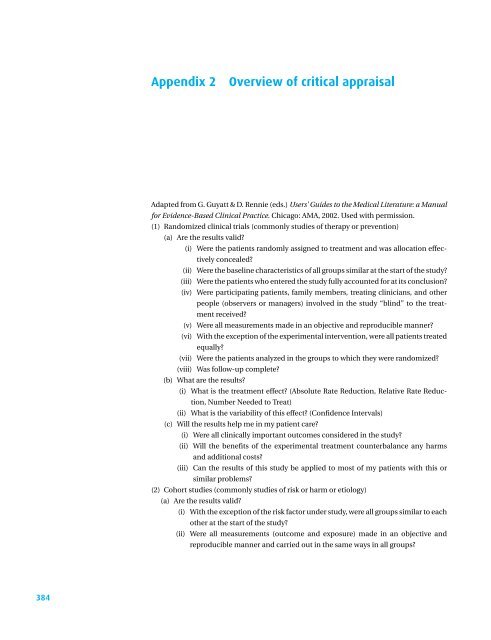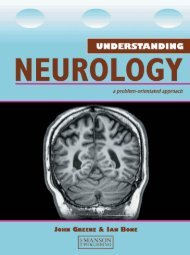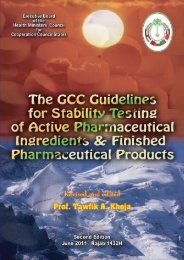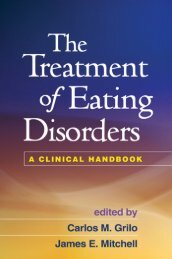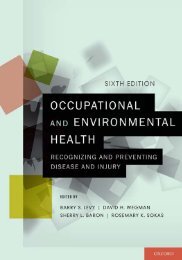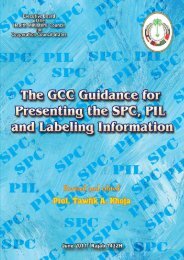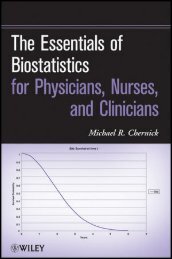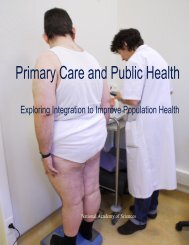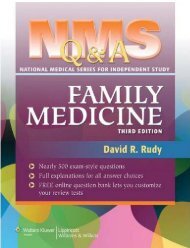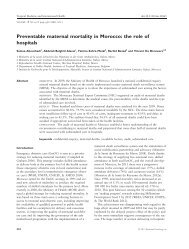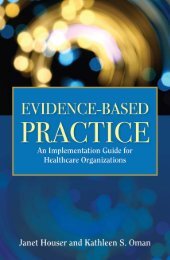- Page 2:
Essential Evidence-Based Medicine S
- Page 5 and 6:
cambridge university press Cambridg
- Page 7 and 8:
vi Contents 17 Applicability and st
- Page 10 and 11:
Preface In 1992 during a period of
- Page 12 and 13:
Foreword The impact of evidence-bas
- Page 14 and 15:
Acknowledgments There are many peop
- Page 16 and 17:
A brief history of medicine and sta
- Page 18 and 19:
A brief history of medicine and sta
- Page 20 and 21:
A brief history of medicine and sta
- Page 22 and 23:
A brief history of medicine and sta
- Page 24 and 25:
What is evidence-based medicine? Th
- Page 26 and 27:
Medical decision making: expert vs.
- Page 28 and 29:
What is evidence-based medicine? 13
- Page 30 and 31:
What is evidence-based medicine? 15
- Page 32 and 33:
What is evidence-based medicine? 17
- Page 34 and 35:
Heavier than air flying machines ar
- Page 36 and 37:
Koch’s postulates stated four bas
- Page 38 and 39:
case-control, orcross-sectional stu
- Page 40 and 41:
The medical literature: an overview
- Page 42 and 43:
The medical literature: an overview
- Page 44 and 45:
Methods The medical literature: an
- Page 46 and 47:
The medical literature: an overview
- Page 48 and 49:
5 Searching the medical literature
- Page 50 and 51:
Mortality Searching the medical lit
- Page 52 and 53:
Searching the medical literature 37
- Page 54 and 55:
Searching the medical literature 39
- Page 56 and 57:
History Searching the medical liter
- Page 58 and 59:
MeSH terms to assist in searching S
- Page 60 and 61:
Fig. 5.8 PubMed MeSH database with
- Page 62 and 63:
Searching the medical literature 47
- Page 64 and 65:
Searching the medical literature 49
- Page 66 and 67:
Searching the medical literature 51
- Page 68 and 69:
Searching the medical literature 53
- Page 70 and 71:
Searching the medical literature 55
- Page 72 and 73:
Study design and strength of eviden
- Page 74 and 75:
Cross-sectional studies Study desig
- Page 76 and 77:
Study design and strength of eviden
- Page 78 and 79:
Study design and strength of eviden
- Page 80 and 81:
Subjects eligible for the study. In
- Page 82 and 83:
Instruments and measurements: preci
- Page 84 and 85:
Instruments and measurements: preci
- Page 86 and 87:
Instruments and measurements: preci
- Page 88 and 89:
Instruments and measurements: preci
- Page 90 and 91:
Instruments and measurements: preci
- Page 92 and 93:
Instruments and measurements: preci
- Page 94 and 95:
Instruments and measurements: preci
- Page 96 and 97:
failed and ultimately he told the t
- Page 98 and 99:
esearchers did not measure the perc
- Page 100 and 101:
inclusion or not enrolled in the st
- Page 102 and 103:
this bias is to dilute the control
- Page 104 and 105:
assuming that missing patients all
- Page 106 and 107:
Table 8.1. Looking for sources of b
- Page 108 and 109:
There are three kinds of lies: lies
- Page 110 and 111:
Mean final exam score 80 60 Mean fi
- Page 112 and 113:
5 87 Reorder these as: 5 78 6 56856
- Page 114 and 115:
Number with score Cumulative number
- Page 116 and 117:
lower half below the 50th percentil
- Page 118 and 119:
Area under each segment of the curv
- Page 120 and 121:
Using the latter without prominentl
- Page 122 and 123:
Table 9.2. Commonly used probabilit
- Page 124 and 125:
Medicine is the science of uncertai
- Page 126 and 127:
alternative hypothesis is accepted
- Page 128 and 129:
ecause a negative result may not be
- Page 130 and 131:
Events of interest Other events Tot
- Page 132 and 133:
Frequency of observations P < 0.05
- Page 134 and 135:
a person’s blood pressure will be
- Page 136 and 137:
One-tailed tests δ δ α = 0.05 P
- Page 138 and 139:
Type I errors and number needed to
- Page 140 and 141:
Type I errors and number needed to
- Page 142 and 143:
Type I errors and number needed to
- Page 144 and 145:
Type I errors and number needed to
- Page 146 and 147:
Negative studies and Type II errors
- Page 148 and 149:
δ 95% CI 95% CI Negative studies a
- Page 150 and 151:
P > 0.05 95% CI SD 1 δ 95% CI Nega
- Page 152 and 153:
Begin with the sample size that was
- Page 154 and 155:
α = 0.05 (twosided) and β = 0.20
- Page 156 and 157:
We saw the risk we took in doing go
- Page 158 and 159:
Risk present (R+) Direction of samp
- Page 160 and 161:
Relative risk = (incidence of outco
- Page 162 and 163:
Risk assessment 147 In the cohort s
- Page 164 and 165:
of the muscles of the body in an as
- Page 166 and 167:
A user’s guide to the trials of h
- Page 168 and 169:
Table 13.1. Actual vs. estimated ra
- Page 170 and 171:
trust such as a doctor is less acce
- Page 172 and 173:
Adjustment and multivariate analysi
- Page 174 and 175:
R3+ R3− R1+ R1− D+ D− A’’
- Page 176 and 177:
Adjustment and multivariate analysi
- Page 178 and 179:
Adjustment and multivariate analysi
- Page 180 and 181:
Dr. Lind found that the two sailors
- Page 182 and 183:
subject of an RCT. The basic rules
- Page 184 and 185:
absolute or relative contraindicati
- Page 186 and 187:
Table 15.2. Effects of acupuncture
- Page 188 and 189:
could result from drop-outs or cros
- Page 190 and 191:
The n-of-1 trial An n-of-1 trial is
- Page 192 and 193:
Table 15.3. Template for the CONSOR
- Page 194 and 195:
16 Scientific integrity and the res
- Page 196 and 197:
Scientific integrity and the respon
- Page 198 and 199:
Scientific integrity and the respon
- Page 200 and 201:
Scientific integrity and the respon
- Page 202 and 203:
17 Applicability and strength of ev
- Page 204 and 205:
Applicability and strength of evide
- Page 206 and 207:
Applicability and strength of evide
- Page 208 and 209:
Applicability and strength of evide
- Page 210 and 211:
Applicability and strength of evide
- Page 212 and 213:
Unsound Research Sound Research App
- Page 214 and 215:
18 Communicating evidence to patien
- Page 216 and 217:
Communicating evidence to patients
- Page 218 and 219:
Communicating evidence to patients
- Page 220 and 221:
Communicating evidence to patients
- Page 222 and 223:
Communicating evidence to patients
- Page 224 and 225:
Types of qualitative research studi
- Page 226 and 227:
Critical appraisal of qualitative r
- Page 228 and 229:
Critical appraisal of qualitative r
- Page 230 and 231:
20 An overview of decision making i
- Page 232 and 233:
An overview of decision making in m
- Page 234 and 235:
Table 20.1. Causes of variability i
- Page 236 and 237:
Table 20.3. OLDCARTS acronym for hi
- Page 238 and 239:
An overview of decision making in m
- Page 240 and 241:
Table 20.4. Mnemonic to remember cl
- Page 242 and 243:
Table 20.6. Differential diagnosis
- Page 244 and 245:
An overview of decision making in m
- Page 246 and 247:
An overview of decision making in m
- Page 248 and 249:
21 Sources of error in the clinical
- Page 250 and 251:
Sources of error in the clinical en
- Page 252 and 253:
Sources of error in the clinical en
- Page 254 and 255:
Patient speaks different language S
- Page 256 and 257:
Sources of error in the clinical en
- Page 258 and 259:
Sources of error in the clinical en
- Page 260 and 261:
eassuring if it is negative. In gen
- Page 262 and 263:
(ii) Blood culture for bacteremia.
- Page 264 and 265:
23 Utility and characteristics of d
- Page 266 and 267:
Post-test ∝ Pretest × probabilit
- Page 268 and 269:
Healthy TN Utility and characterist
- Page 270 and 271:
Utility and characteristics of diag
- Page 272 and 273:
Table 23.2. Mnemonics for sensitivi
- Page 274 and 275:
Utility and characteristics of diag
- Page 276 and 277:
24 Bayes’ theorem, predictive val
- Page 278 and 279:
Bayes’ theorem and predictive val
- Page 280 and 281:
If+; PPV if−; FRR Pretest probabi
- Page 282 and 283:
The nomogram % Bayes’ theorem and
- Page 284 and 285:
T+ T− Bayes’ theorem and predic
- Page 286 and 287:
Bayes’ theorem and predictive val
- Page 288 and 289:
Bayes’ theorem and predictive val
- Page 290 and 291:
LR+ = (36/90)/(18/910) = 20 LR− =
- Page 292 and 293:
Table 25.1. Sensitivity and specifi
- Page 294 and 295:
Comparing tests and using ROC curve
- Page 296 and 297:
Comparing tests and using ROC curve
- Page 298 and 299:
Incremental gain and the threshold
- Page 300 and 301:
Incremental gain and the threshold
- Page 302 and 303:
Incremental gain and the threshold
- Page 304 and 305:
no test no treat Incremental gain a
- Page 306 and 307:
Incremental gain and the threshold
- Page 308 and 309:
Incremental gain and the threshold
- Page 310 and 311:
27 Sources of bias and critical app
- Page 312 and 313:
Sources of bias and critical apprai
- Page 314 and 315:
Observer bias Sources of bias and c
- Page 316 and 317:
Reproducibility Sources of bias and
- Page 318 and 319:
Sources of bias and critical apprai
- Page 320 and 321:
Sources of bias and critical apprai
- Page 322 and 323:
Sources of bias and critical apprai
- Page 324 and 325:
Sources of bias and critical apprai
- Page 326 and 327:
Onset of disease Asymptomatic Sympt
- Page 328 and 329:
so low in this population that even
- Page 330 and 331:
No screening Screened but early tre
- Page 332 and 333:
Table 28.2. Screening 40- to 50-yea
- Page 334 and 335:
not want the treatment. You should
- Page 336 and 337:
Practice guidelines and clinical pr
- Page 338 and 339:
Practice guidelines and clinical pr
- Page 340 and 341:
Practice guidelines and clinical pr
- Page 342 and 343:
Table 29.2. Levels of clinical deci
- Page 344 and 345:
Practice guidelines and clinical pr
- Page 346 and 347:
Practice guidelines and clinical pr
- Page 348 and 349: 30 Decision analysis and quantifyin
- Page 350 and 351: Decision analysis and quantifying p
- Page 352 and 353: Starting decision node: patient pre
- Page 354 and 355: Sensitivity analysis 1 E 0 0 Decisi
- Page 356 and 357: Sensitivity 1 0 Decision analysis a
- Page 358 and 359: Decision analysis and quantifying p
- Page 360 and 361: Mild symptoms Decision analysis and
- Page 362 and 363: Decision analysis and quantifying p
- Page 364 and 365: Decision analysis and quantifying p
- Page 366 and 367: treatment costs more and is clearly
- Page 368 and 369: common use by the bulk of physician
- Page 370 and 371: Table 31.2. Comparing doxycycline t
- Page 372 and 373: attempt to identify these subgroups
- Page 374 and 375: He ended; and thus Adam last replie
- Page 376 and 377: Table 32.1. A study of 71 patients
- Page 378 and 379: Survival analysis and studies of pr
- Page 380 and 381: 9 8 7 6 5 4 3 2 1 x 1970 1975 1977
- Page 382 and 383: 33 Meta-analysis and systematic rev
- Page 384 and 385: Meta-analysis and systematic review
- Page 386 and 387: Meta-analysis and systematic review
- Page 388 and 389: % responding with treatment 100 80
- Page 390 and 391: Study Fletcher Dewar European 1 Eur
- Page 392 and 393: Meta-analysis and systematic review
- Page 394 and 395: Levels of evidence Differential dia
- Page 396 and 397: c By poor-quality cohort study we m
- Page 400 and 401: Appendix 2: Overview of critical ap
- Page 402 and 403: Appendix 3 Commonly used statistica
- Page 404 and 405: Appendix 4 Formulas Descriptive sta
- Page 406 and 407: Appendix 4: Formulas 391 95% confid
- Page 408 and 409: Appendix 5: Proof of Bayes’ theor
- Page 410 and 411: Appendix 6: Using balance sheets to
- Page 412 and 413: Arm (of decision tree) A particular
- Page 414 and 415: Critical appraisal The process of a
- Page 416 and 417: False negative (FN) Patients with d
- Page 418 and 419: Intrinsic characteristics of a diag
- Page 420 and 421: Outcomes study The outcome of an in
- Page 422 and 423: Quality of life A composite measure
- Page 424 and 425: Statistical significance A measure
- Page 426 and 427: Common medical journals Bibliograph
- Page 428 and 429: There has been a real explosion of
- Page 430 and 431: Department of Clinical Epidemiology
- Page 432 and 433: Moses, L. E. Statistical concepts f
- Page 434 and 435: Bucher, H. C., Guyatt, G. H., Cook,
- Page 436 and 437: Richardson, W. S., Wilson, M. C., G
- Page 438 and 439: NHS Centre for Reviews and Dissemin
- Page 440 and 441: Locators in italic refer to figures
- Page 442 and 443: chance nodes 336, 336 children, exa
- Page 444 and 445: pattern recognition 228-9, 231 phys
- Page 446 and 447: quotation 9 steps in practicing 14-
- Page 448 and 449:
inferential statistics 94, 387, 402
- Page 450 and 451:
methods 28, 29, 171, 304-5, 368-9,
- Page 452 and 453:
positive likelihood ratios 254, 255
- Page 454 and 455:
etrospective bias 368 retrospective
- Page 456 and 457:
surrogate markers 20, 59, 72, 89-90


